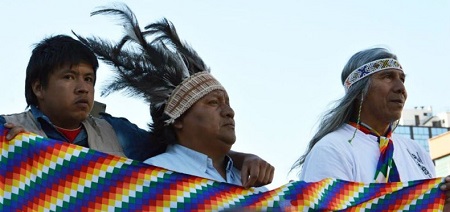The Inter-American Commission on Human Rights has just issued a new report examining, for the first time, the issue of the extraterritorial application of human rights within the context of extractive and development projects. The report includes an analysis of issues in the context of foreign investment and the obligations of states hosting investment and at its source.
Through the implementation of its monitoring mechanisms, the Commission has consistently received information evidencing the human, social, health, cultural and environmental impacts of these projects on indigenous peoples and Afrodescendent communities. Many extractive and development activities in the hemisphere are implemented in lands and territories historically occupied by indigenous and Afro-descendent communities, which often coincide with areas hosting a great wealth of natural resources.
Both host states and states of origin do properly supervise these projects and activities to prevent human rights violations, and overcome the formidable barriers faced by victims, peoples, and communities to access justice when these human rights violations take place.
The Commission’s report underscores that it recognizes the importance of these initiatives in the Americas to advance the prosperity of the peoples of the hemisphere, and may involve the sovereignty of every state to exploit its natural resources through the (1) embodying the self-determination of its peoples and (2) the state’s government granting concessions and investments of a private or public, national or international nature toward development objectives.
Therefore, in the report the Commission affirms that, although the rules of the inter-American system neither prevent nor discourage development projects, the Member States of the Organization of American States (hereinafter “OAS”) bear ineluctable obligations under the inter-American human rights instruments to respect and guarantee relevant rights in all settings, including in regard to
extraction and development activities.
The report is the result of research into cases from Belize, Brazil, Colombia, Chile, Costa Rica, Ecuador, Guatemala, Honduras, Mexico, Nicaragua, Panama, Peru and Suriname, among others. The report explores a wide range of human rights affected in such projects and transactions. It finds that the implementation of extractive and development projects affect the rights to life, to physical integrity, to health, to nondiscrimination, to consultation, consent and to cultural identity, information and
participation, among others.
The report advises that a first essential state obligation is the duty to adopt an appropriate regulatory framework for the protection of human rights in the context of extraction and development activities. The general obligation to guarantee human rights encompasses the duty to prevent human rights violations, which requires prior identification and proper monitoring of the impact that a specific plan or project could generate on the human rights of the population affected by it, both before granting the authorization or permit, and during project implementation. Closely linked to this issue, and as a component to the obligation of prevention, is the duty to supervise and oversee the activities that may affect human rights. The Commission also refers to the duty to prevent illegal activities and forms of violence against the population in areas affected by extraction and development activities. Likewise, the Commission believes that in the decision-making process for authorizing extractive activities, the rights of access to information and public participation are especially important for the protection and defense of human rights which may be affected.
Subsequently, the Inter-American Commission’s study addresses some of the main impacts that the implementation of extractive and development projects has on the rights of indigenous and tribal peoples, and Afro-descendent communities. The new report refers, in particular, to violations of the right to collective ownership of indigenous and tribal peoples, and Afro-descendent communities over their lands, territories and natural resources; the right to cultural identity and religious freedom; the right to life, health, personal integrity, and a healthy environment; economic and social rights such as food, access to water2 and labor rights; the right to personal liberty and social protest; and protection from forced displacement. The Commission also notes some of the specific impacts on different groups and collectivities of special concern, such as indigenous authorities and leaders; human rights defenders; women; children; older persons; and persons with disabilities.
Finally, the Inter-American Commission issues recommendations to the states on the obligations and lines of action they should follow under international human rights law to achieve the full protection of human rights in the context of activities of this nature, and more specifically, the States’ duties with regard to the rights of indigenous peoples and Afro-descendent communities in these scenarios.
Photo on home page: The extractivist industry operating in Argentina. Source: The Dawn. Photo on this page: Felix Diaz (far right) and other leaders of the Qom and Wichi indigenous groups have maintained a protest camp on the main avenue of Argentina`s capital of Buenos Aires for more than six months to protest the loss of their lands to development projects, while the 2030 Sustainable Development Agenda was being negotiation at the United Nations. Source: Fionuala Cregan.














